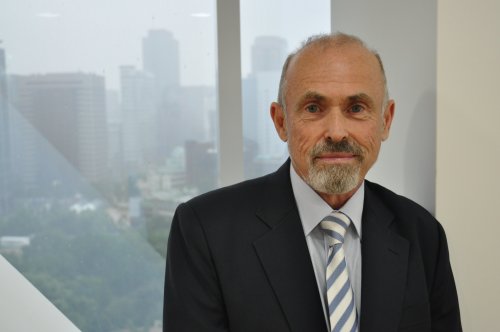Amb. Tonseth returns to a shell-shocked yet determined country
After five years, Norwegian Ambassador Didrik Tonseth has finished his term in Seoul and is on his way back to his home in Oslo.
He leaves a country that he called home, enjoying every aspect of life here while promoting Norwegian-Korean interests and helping Korea to achieve international heights such as winning the bid to host the winter Olympics.
But Tonseth returns to a different Norway, a country still mourning and shell-shocked from the tragic shooting that saw 77 of its sons and daughters killed and dozens wounded in the Nordic country’s worst attack since World War II.
A country more accustomed to dealing with other nations’ conflicts than its own, Norway will spend a long time grieving for the people who lost their lives at the hands of gunman Anders Behring Breivik.
Tonseth explained that his country will not change course because of the actions of a terrorist.
“We have consistently advocated the values of democracy, the rule of law, freedom of speech and human rights in our endeavors to overcome extremism and intolerance. These attacks will not change our policies,” he said.
“The reaction of the Norwegian people is to reject everything that he (confessed killer Anders Behring Breivik) stands for,” he said.
“Many immigrants have said that they feel much more included in society after what happened because the Norwegians, in unison, expressed their dismay and shock,” Tonseth added.
In the aftermath of the tragedy, an estimated 200,000 people laid flowers in Oslo, an event which became known as the flower march, in a sign of rejection of what one of their own did to the people of Norway.
“Norway is a very open and liberal society,” he said.
“It’s where politicians walk freely on the streets, even the prime minister walks to parliament if he so cares,” Tonseth said. “We don’t want to close Norway because of one person.”
 |
Norway Ambassador Didrik Tonseth (Yoav Cerralbo/The Korea Herald) |
Norway’s place internationally
“Norway will continue its commitment to the values we believe in, and continue to stand up for them internationally. We will not let the perpetrator feel that he has succeeded in changing Norwegian society.”
On the international stage, Norway will continue its policy of dialogue and engagement.
Since 1945, Norway has participated in over 25 United Nations peacekeeping operations, sending more than 50,000 Norwegian troops to these operations, including participating in the Korean War.
Today, Norway’s involvement in U.N.-mandated and U.N. peacekeeping operations is focused on Afghanistan, Sudan, and the Middle East.
“This will not affect our foreign policies, neither domestically nor at the international level,” said Tonseth.
Open door country
A country that hosts the Nobel Peace Prize and is actively trying to resolve conflicts in many places, Norway will also not change its policies of welcoming the world’s destitute and huddled masses.
“Shortly after the tragedy, the prime minister went to a mosque and made a speech, he had the crown prince with him sitting on the floor in the mosque. We actively seek dialogue across cultural differences and I’m sure this is what we will continue to do: it’s the only way,” he said with a soft tone.
Tonseth added that because of the government’s active involvement in bridging gaps, tensions in Norway are generally non-existent.
Prevention as cure
Amid growing criticism that it took officers too long to halt the killing spree, Prime Minister Jens Stoltenberg announced that his government will set up an independent commission to get to the truth.
“Let me emphasize that it took exactly one hour from the time the police was alerted until the perpetrator was arrested. Considering the distance from Oslo to Utoya, I think the police acted quickly. It is impossible to say what the recommendations of the commission will be. There may be some recommendations in terms of security, although it is too early to say,” Tonseth said.
Stoltenberg announced that the aim of the commission would be to “map out what functioned well and what functioned less well.”
“It’s important to understand all the aspects of these attacks, to draw lessons from what has happened,” Stoltenberg said during a press conference on July 27.
Fond farewell
Just days before Tonseth left, he told The Korea Herald that one of the things he would miss is Korea’s nature. He and his wife spent many weekends walking along the hills of Seongbuk-dong enjoying the changing seasons.
He is perhaps most proud of entering into a three-year agreement with the Seoul Metropolitan Transport Corporation to bring Norway into Samgakji Station’s Line 6 through pictures and video installments.
He is also proud of bringing cross-country skiing to a new level of enjoyment in the country.
Besides the Skarven Race that the embassy hosts at the Alpensia Cross-country Stadium in PyeongChang, Tonseth has a plan to bring the sport he loves to one of Seoul’s Han River parks.
“Even though there is generally little snow in Seoul, we can produce snow from the Han river, because the temperatures in winter are freezing so it’s easy to lay tracks,” he said. “This could be seen as in preparation to try to get Korean skiers to compete competitively in the 2018 Winter Olympics in PyeongChang.” Such an event will also include preparations for the 2018 Paralympics.
Tonseth was one of the more active foreign ambassadors in helping the local Olympic committee achieve the goal of hosting the Winter Games in the Gangwon Province resort town.
By Yoav Cerralbo (
yoav@heraldcorp.com)








![[Herald Interview] How Gopizza got big in India](http://res.heraldm.com/phpwas/restmb_idxmake.php?idx=644&simg=/content/image/2024/11/20/20241120050057_0.jpg)